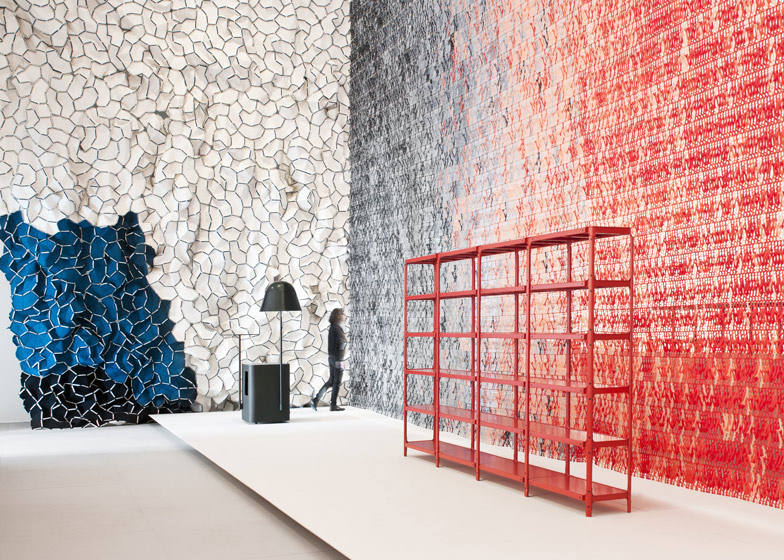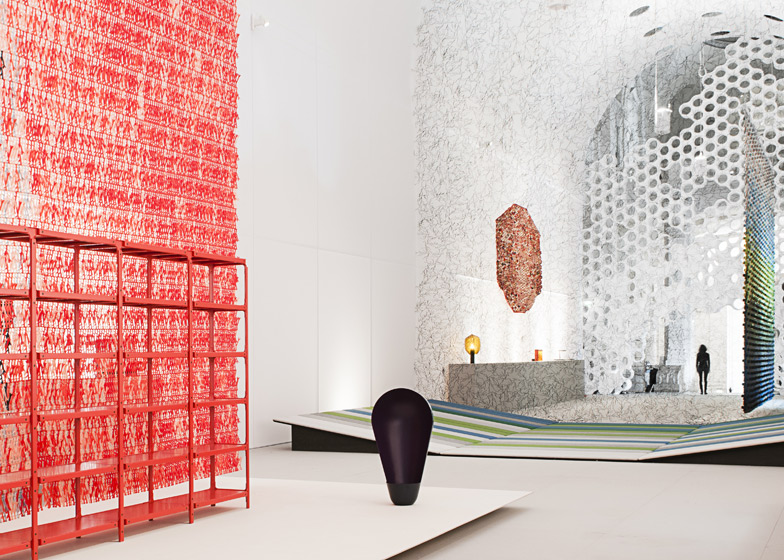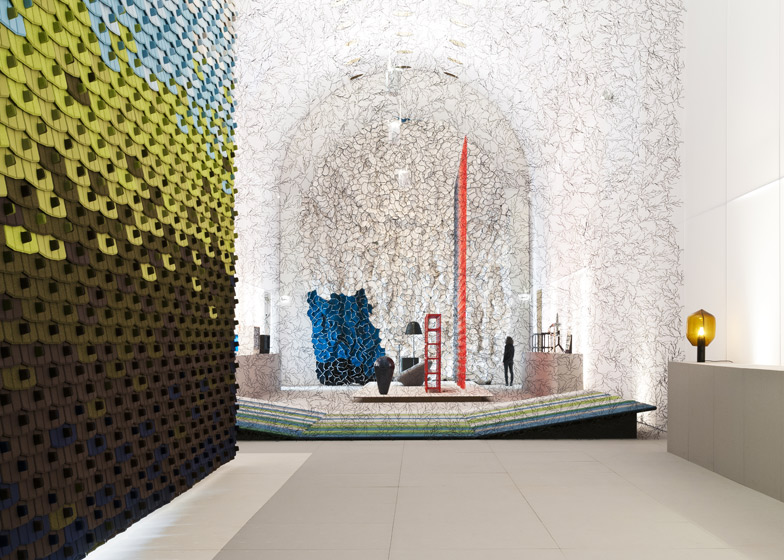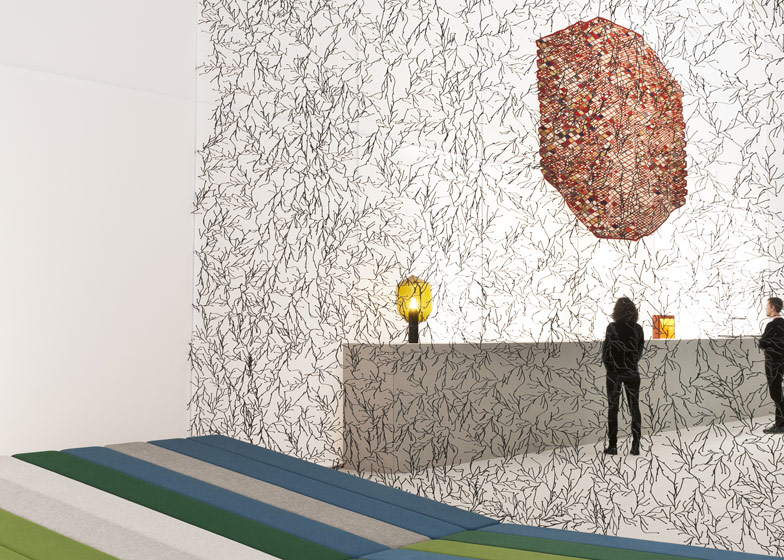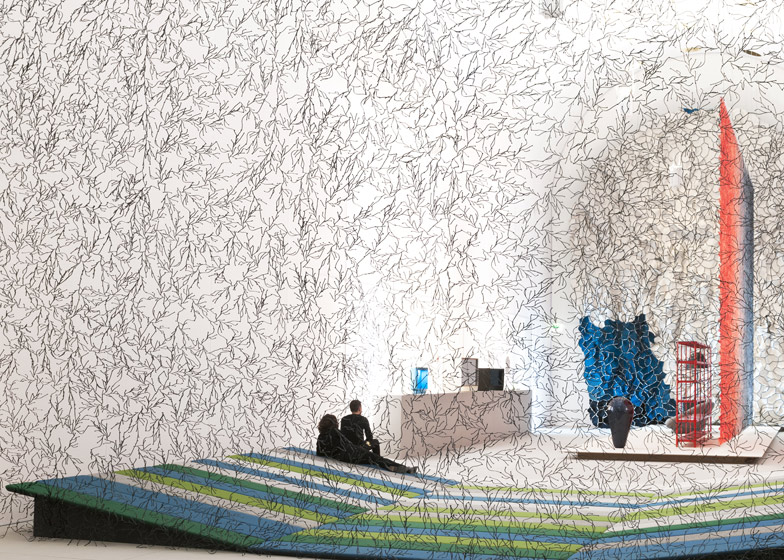An exhibition showcasing 15 years of design by Ronan and Erwan Bouroullec has opened at Les Arts Décoratifs museum in Paris.
Called Momentané, the show looks back at the Bouroullec brothers' career so far and features furniture, lighting, spatial designs, drawings, videos and photographs.
The largest room is dominated by a 12-metre-high textile installation and a series of partitions designed by the brothers.
Objects such as the brothers' Losanges rugs for Nanimarquina and Assemblages furniture for Galerie Kreo are displayed on podiums covered with their Pico tiles for Mutina.
In one of the side aisles is a collection of their office furniture, including the Copenhagen furniture designed for the Danish city's university and produced by Hay, and the Ready Made Curtain system for Kvadrat.
Six alcoves contain objects designed for domestic spaces, such as the Alcove sofa for Vitra and the Cloud modular shelving system for Cappellini, as well as drawings and photographs exploring the brothers' creative process.
The Momentané exhibition continues at Les Arts Décoratifs, 107 Rue de Rivoli, Paris, until 1 September 2013.
Recent work by the Bouroullecs includes a courtyard installation of rotating cork platforms in Milan last month and an aluminium chair and sideboard for Magis – see all design by Ronan and Erwan Bouroullec.
Here's more information from Les Arts Décoratifs:
From 25 April to 1 September 2013, Ronan and Erwan Bouroullec are revisiting fifteen years of creation in the Arts Décoratifs nave. Conceived as a gigantic installation combining the spectacular and the intimate, the 1,000 square-metre exhibition covers their entire career, highlighting every facet of their production: their objects and spatial designs, their limited editions and industrially produced pieces, their furniture for public spaces and the home, and their drawings, videos and photographs.
The Bouroullec brothers are focussing on three approaches to their work in the nave and its two side-aisles: in the nave in an installation in a vast architectural space; on the Tuileries side, with their reflection on the office and workspace, and on the Rivoli side with a more intimist approach highlighting their creative process.
Beneath a 12 metre-high textile vault in the nave, Erwan and Ronan Bouroullec have created an abstract landscape structured by their partition designs (Algues, North Tiles, Twigs, Clouds), which divide the space and guide visitors through the exhibition. On entering this monumental, surprising universe one is immediately immersed in its singular atmosphere. Like an openwork screen, the polystyrene Nuages opens the exhibition, then one is led by the partitions through a series of their creations displayed on podiums covered with the Pico tiles produced by Mutina, including the Losanges rugs for Nanimarquina and the Assemblages furniture for Galerie Kreo. These confrontations play on changes in scale and highlight their delicate, sensual aspects. Through the Algues screen one has a view of the Textile Field, originally created in 2011 for the Raphael Cartoons room in the Victoria & Albert museum.
In the Tuileries aisle, the Bouroullec brothers are focussing on their reflection on the workspace, which began with the Joyn desks for Vitra, a collaboration they are pursuing with their most recent creations, Workbay and Corktable. The Copenhagen furniture, produced by Hay, was specially designed and created for the new university of Copenhagen. Their designs for the office environment are pragmatic responses to the most recent evolutions in working practices: alone or with others and therefore requiring either intimate spaces conducive to concentration or, on the contrary, collective work areas. Visitors will be able to test the ergonomics and use of these pieces by trying out the furniture themselves. Separate workspaces can also be created with the Ready Made Curtain, a new system of very light, ready-to-install curtains developed for Kvadrat. 300 abstract drawings, either free expressions or linked to a specific design project, are being shown on the walls of this gallery.
The six alcoves in the Rivoli aisle focus on objects designed for more domestic and intimate spaces. These pieces, chosen for the dialogue they create with one another, are contextualised by models and a constellation of images. Preparatory drawings and photographs of factory production and details show the processes of creation and production.
In only fifteen years of prolific creativity, the Bouroullec brothers have produced an impressive body of work – furniture, objects, partitions, etc. – in an always simple and functional style and providing new solutions to contemporary lifestyles. They are particularly interested in problems of space and modularity. They often work on a quasi-architectural scale: one of their first pieces, the Lit Clos bed, created in 2000 for the Milan Furniture Fair, was designed for people living in a single room, and the Alcove Sofa (Vitra, 2007) can be transformed into a sofa or partition. The Cloud modular system (Cappellini) combines shelfs and partitions, the Algues (Vitra) and Twigs (Vitra) modular systems are assembled to create openwork screens, and the North Tiles (Kvadrat) and Clouds (Kvadrat) partitions are designed for acoustic comfort.
Fifteen years of creation
Ronan Bouroullec studied at the Ecole Nationale Supérieure des Arts Décoratifs and began his career working alone, immediately showing his originality in the Torique collection of combinatory vases and ceramics he produced at Vallauris in 1997. In 1999, Ronan was joined by his brother Erwan, who trained at the Ecole Nationale Supérieure d’Arts Paris- Cergy. Their continual creative dialogue and prolific output was concretised by their collaborations with major design publishers. The first of these, Giulio Cappellini, enabled them to rapidly assimilate industrial production methods in creations such as the Hole collection in 1999 and the Spring Chair in 2000. They then began their close creative relationship with Rolf Fehlbaum, chairman of Vitra, which produced many of their projects, including the Joyn modular desks (2002), the Algues modular partition system (2004) and more classical types of objects such as the Slow Chair (2007) and Vegetal Chair (2009).
The brothers also produced designs for other design manufacturers in Italy such as Magis (the Striped and Steelwood furniture) and Kartell (the Papyrus chair) and in England such as Established & Sons (the Quilt sofa and Lighthouse lamp). In France, they developed several pieces for Ligne Roset, a manufacturer specialised in seating, including the Outdoor chair, the origami-inspired Facett sofa and armchair collection and the Ploum sofa, whose exceptional comfort is the result of intensive research.
Their collaboration with Galerie Kreo from 2000 onwards enabled them to develop more experimental designs and explore themes dear to them, particularly the frontier between furniture and architecture, in pieces such as Cabane and Brick. Kreo provided them with a free environment in which they could propose projects unaffected by habitual industrial constraints: the Bells lamps, the Rizière table and the Lianes lights.
In parallel, the Bouroullec brothers have also designed exhibitions and interiors, including Issey Miyake's first A-POC shop in Paris in 2000, the Maison Flottante for the Centre National de l'Estampe et de l'Art imprimé at Chatou, and more recently the Camper shops. The design of the showrooms of the textile brand Kvadrat in Stockholm was an opportunity for them to develop the Tiles and Clouds modular textiles partitions. From 2010 to 2013 they began new collaborations and widened their fields of activity. They designed a complete bathroom range for Axor (Hansgrohe group), the Piani and Aim lamps for Flos, the Losanges rug for Nanimarquina, the Ovale table service for Alessi, the Pico ceramic tiles collection for Mutina and university furniture for Hay. Their creations are now in numerous museums, including the Musée des Arts Décoratifs and the Musée National d’Art Moderne–Centre Pompidou in Paris, the Museum of Modern Art in New York, the Art Institute of Chicago, the Design Museum in London and the Museum Boijmans van Beuningen in Rotterdam.
Publication
To coincide with this exhibition, DRAWING, a book of 800 drawings dating from 2004 to 2012, is being published by JRP Ringier. Drawing is their main day-to-day activity and the pencil the principal tool in their creative process and means of concretising their emotions, both as part of specific research in a project's development or as a means of free personal expression.
The Arts Décoratifs Museums
107 rue de Rivoli, 75001 Paris
Open Tuesday to Sunday 11am to 6pm (late opening Thursday until 9pm: Temporary exhibitions and jewellery gallery only)

